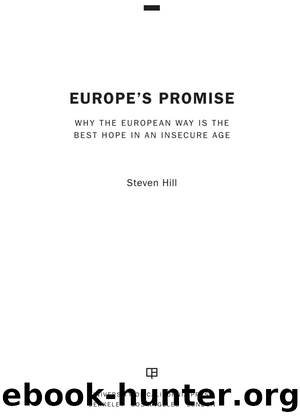Europe's Promise by Steven Hill

Author:Steven Hill
Language: eng
Format: epub
Publisher: University of California Press
Published: 2012-01-22T16:00:00+00:00
WHAT TWENTY-FIRST-CENTURY DEMOCRACY LOOKS LIKE
Europe’s advanced democracy is evident in fascinating ways, large and small, incorporating macro- and microinstitutions. On the little d democracy side, we see microinstitutions such as Question Time in Britain, Sweden, Italy, France, and elsewhere, a weekly grilling, often televised, of the prime minister and other government officials by the opposition party. In Britain, Question Time provides great political theater, and it’s informative as well. Once after delivering a lecture at Westminster to members of Parliament, I enjoyed an MP-led tour of the British Parliament buildings and had an opportunity to stand in the exact spot in the House of Commons where Prime Minister Tony Blair stood during Question Time. As I grasped both sides of Mr. Blair’s podium—which I was told is exactly two sword lengths away from the opposition’s, so as to prevent any rash political murders in the good ol’ days—the thought struck me like a lightning bolt: What if we had Question Time in the United States? What if, once a week, George W. Bush, or any president, had to stand up and explain the rationale for his policies, under intense grilling by the opposition, all of it televised? Wouldn’t that have made a difference in the rush to war in Iraq? And wouldn’t that force more transparency in that hall of mirrors that is Washington DC? A small change like Question Time would probably change American politics forever, or at least alter the types of people foisted upon us as candidates.
Other microdemocratic methods in Europe are admirable. In France, no postage is necessary to mail a letter or postcard to the president. Most European nations vote on a weekend or a national holiday, making this seminal democratic ritual more revered, as well as more convenient, and providing a greater pool of poll workers for election day. Speakers’ Corner in London’s Hyde Park, which is a haven of free speech and is frequented by all sorts of political freaks and loudmouths, is not only an entertaining place to spend a few hours but also a quaint reminder of the importance of protecting even offensive speech in a free society. In Sweden, jailed prisoners are allowed to vote; in fact, most European democracies allow prisoners to vote, because voting is considered a human right as well as an essential part of a prisoner’s rehabilitation.5 But in the United States, only two states, Maine and Vermont, allow prisoners to vote, and most states have created byzantine procedures for restoring ex-felons’ voting rights.6
Europe also practices what is known as “universal voter registration”—all eligible voters automatically are registered to vote by the government. It is done proactively, on a rolling basis, and the goal is to have 100 percent registration. A national voter database is maintained, and when a person reaches voting age she or he is welcomed into the ranks of the enfranchised. But in the United States we have an “opt-in” system in which it is left to the individual to fill out a form and register with the appropriate authorities.
Download
This site does not store any files on its server. We only index and link to content provided by other sites. Please contact the content providers to delete copyright contents if any and email us, we'll remove relevant links or contents immediately.
| Africa | Americas |
| Arctic & Antarctica | Asia |
| Australia & Oceania | Europe |
| Middle East | Russia |
| United States | World |
| Ancient Civilizations | Military |
| Historical Study & Educational Resources |
Magic and Divination in Early Islam by Emilie Savage-Smith;(1532)
Papillon by Henry Charrière(1421)
Bohemians, Bootleggers, Flappers, and Swells: The Best of Early Vanity Fair by Bohemians Bootleggers Flappers & Swells- The Best of Early Vanity Fair (epub)(1394)
Ambition and Desire: The Dangerous Life of Josephine Bonaparte by Kate Williams(1383)
Twelve Caesars by Mary Beard(1311)
Operation Vengeance: The Astonishing Aerial Ambush That Changed World War II by Dan Hampton(1155)
What Really Happened: The Death of Hitler by Robert J. Hutchinson(1154)
London in the Twentieth Century by Jerry White(1145)
The Japanese by Christopher Harding(1129)
Time of the Magicians by Wolfram Eilenberger(1125)
Twilight of the Gods by Ian W. Toll(1112)
Lenin: A Biography by Robert Service(1072)
The Devil You Know by Charles M. Blow(1023)
A Social History of the Media by Peter Burke & Peter Burke(968)
Freemasons for Dummies by Hodapp Christopher;(963)
Napolean Hill Collection by Napoleon Hill(936)
Henry III by David Carpenter;(919)
The Churchill Complex by Ian Buruma(906)
The Rise and Triumph of the Modern Self by Unknown(904)
